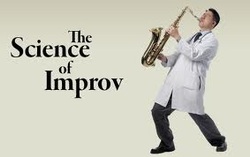 It is never too late to learn. Brain cells may die, but new pathways can always form. As our mind compartmentalize in order to make sense of the world, the brain is still the most flexible organ a human possess. Called Plasticity, it should give musicians and want-to-be musicians hope to be renewed. Dr. Charles Limb pictured above (Limb, 2008), of the JHU Medical School, has spent more than ten years studying the brain activity of musicians as they improvise. Using MRI machines, he has found that the region of the brain associated with decision-making and self-censoring (the prefrontal cortex) is slowed down when one improvises. Hence, when one improvises, inhibitions are lowered and cognitive blocks are reduced. As a classical musician, have you had thoughts during performance, hindering your full potential? What do you think, how do you feel, and what do you do when you make a “mistake” during a performance? How aware are you of your balance between “control” and “letting go” during a performance? When one improvises, there can be no mistake, just choices and consequences. Even in Classical music, there may be numerous options to shape one particular phrase, so options of sounds, articulation, pacing and so forth will be depending on the first few notes. To embrace a mistake is a difficult attitude for musicians to adopt, as the digital age convinced the world that there is such a thing as a perfect performance. The model of competitions where one sensitivity is pitched against another for judging, is the wrong model to produce true musicians who enjoy playing music without self-criticism turned on permanently. Perhaps improvising is one way to regain our freedom. The freedom to be expressive, the freedom to make "mistakes" and still make music. Try it if you haven't.
0 Comments
Leave a Reply. |
AuthorLook for Mindful Music Academy Facebook page. Archives
March 2020
Categories
|
||||||

 RSS Feed
RSS Feed